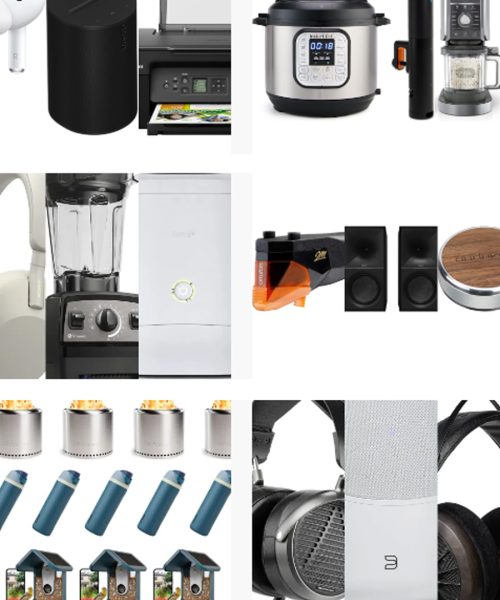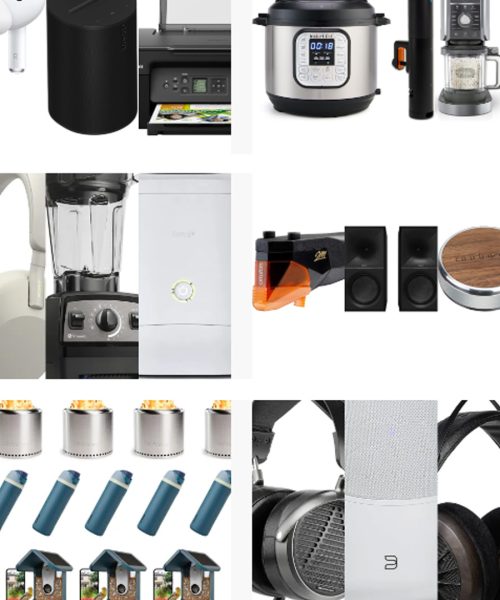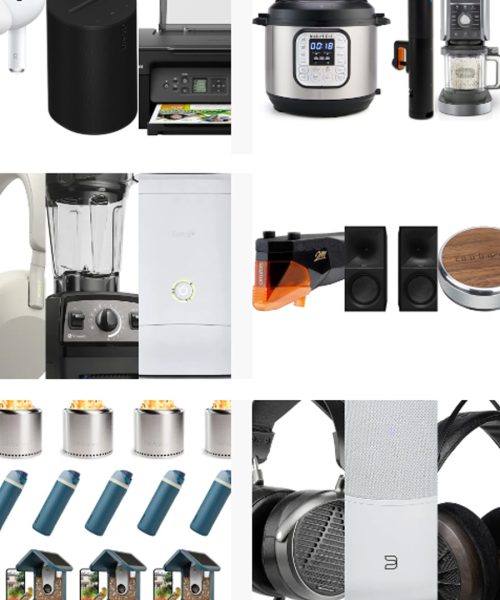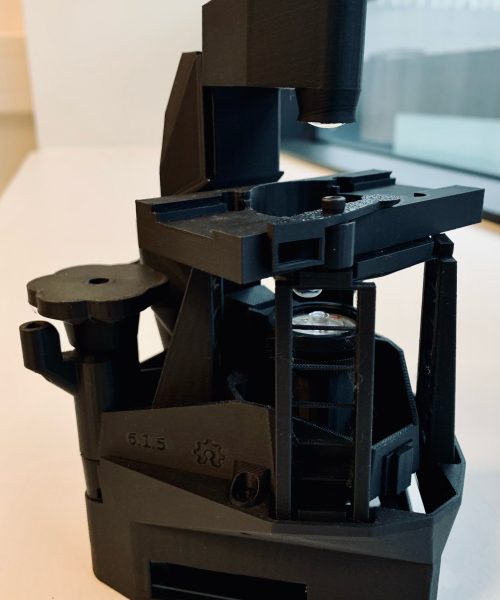We may earn revenue from the products available on this page and participate in affiliate programs. Learn more ›
Anyone can greatly benefit from a smart air purifier. “Air purifiers which are scientifically validated, ideally through independent third-party testing, work to reduce the burden of indoor air pollutants, resulting in a healthier indoor environment for building occupants,” Dr. John McKeon, CEO of Allergy Standards Limited, a company he founded while working as an emergency room doctor, says. If you have a smart home, these air purifiers will fit right in. They can automatically detect and adjust fan speed, like our best overall pick, the Levoit Core 600S Smart Air Purifier. The best smart air purifiers can also be connected to your Wi-Fi router and controlled via mobile app—and perhaps with voice control as well.
- Best overall: Levoit Core 600S Smart Air Purifier
- Best runner-up: Alen BreatheSmart 75i
- Best design: Coway Airmega 400S
- Best splurge: Jaspr Pro Air Purifier
- Best hot and cool: Dyson Hot + Cold Formaldehyde HP09
- Best wall-mountable: Rabbit A3 Air Purifier
How we chose the best smart air purifiers
To compile this list of the best smart air purifiers, we conducted extensive research, contacted Dr. McKeon, and did lots of first-hand testing. With smoking neighbors next to our primary tester (yours truly), we’re always looking for and testing air purifiers to determine which are most effective—and every selection on this list has been tested. We also considered peer recommendations and consumer reviews, the clean air delivery rate (CADR), recommended room sizes, and air filtration systems.
The best smart air purifiers: Reviews & Recommendations
When discussing an air purifier, we believe the most important criterion is filtering unhealthy air in your home as quickly as possible. None of the budget-priced options we tested had a sufficient CADR to be included on our list of the best smart air purifiers. You can rest assured that the rest of our picks have a high CADR with other bells and whistles to boot.
Best overall: Levoit Core 600S Smart Air Purifier
Specs
- Dimensions: 12.x 3 x 12.3 x 23.6 inches
- Weight: 13.7 lbs
- Recommended coverage area: 635 square feet
- CADR: 410
- Noise level: 26-55 db
Pros
- Vesync app for smart control
- Voice control (Amazon Alexa, Google Assistant)
- Very high CADR (clean air delivery rate)
- 3-stage filtration system
- Lightweight and includes handle
Cons
- Tricky to remove top to change filter
The Levoit Core 600S Smart Air Purifier is our best overall choice because it checks the boxes for so many other “best” categories as well. For example, it’s one of the best-rated air purifiers, one of the best value air purifiers (not to be confused with best budget), one of the best large space air purifiers, and has one of the best designs.
It’s hard to believe that this compact device packs so many punches. For starters, the Levoit Core 600S has a lightweight, compact design, so it doesn’t take up much space. It’s my top choice as the best air purifier for smoke, and it does a fantastic job of removing secondhand tobacco smoke from my neighbors. The air purifier also removes dust, lint, hair, pet fur, and other contaminants. It has a CADR of 410, which is quite impressive since many air purifiers have a clean air delivery rate in the 100 to 200 range. In a 635 sq. ft. room, the Levoit Core 600S can clean the air five times in an hour. In a 1,588 sq. ft. room, it can clean the air two times in an hour.
The control panel includes fan speed indicators, fan speed button, sleep mode button, check filter indicator and also a filter reset button, light sensor, timer button (the timer can be set for 1-12 hours), Wi-Fi indicator, display lock indicator, display off button, and PM 2.5 timer display. The easy-to-read air quality indicator rings are blue when the air is very good, green when it is good, orange when it is moderate, and red when the air quality is bad.
After using Wi-Fi to download the VeSync App (via the App Store or Google Play), air purifier settings can be changed remotely, and I can also view real-time air quality updates. The app also lets me create and customize schedules, set a timer for 1–24 hours, and view the remaining filter life as a percentage. Using the VeSync app, I can connect the smart air purifier to Amazon Alexa or Google Assistant for voice control.
The Levoit Core 600S uses a 3-stage filtration system. The pre-filter captures such particles as dust, hair, lint, and pet fur. The H13 True HEPA filter captures 99.97% of airborne particles (0.3 microns in size), such as smoke, fine dust, pollen, and pet dander. The high-efficiency activated carbon filter absorbs smoke, fumes (like VOCs and formaldehyde), and other foul odors from the air.
The pre-filter needs to be cleaned every 2 to 4 weeks, and the HEPA filter and activated charcoal filter should be replaced every 6 to 12 months.
Best runner-up: Alen BreatheSmart 75i
Specs
- Dimensions: 27 x 18.5 x 11.5 inches
- Weight: 27 lbs
- Recommended coverage area: 1300 square feet
- CADR: 350
- Noise level: 25 – 49dB
Pros
- Wi-Fi connectivity via Alen Air App
- Three filter choices
- Cleans up to 2600 square feet
- Swappable stylish panels
Cons
- Costs a pretty penny
- Heavy
While we think the Levoit Core 600 is the best air purifier for most people—and comes in under $300 at the time of publication—the Alen BreatheSmart 75i Air Purifier is the best overall choice for those who can afford to spend more on a smart air purifier. It’s certainly the most versatile air purifier that we’ve tested. The powerful Alen BreathSmart 75i can change the air in a 2,800 sq. ft. room in an hour and that of a 1,400 sq. ft. room in 30 minutes.
One of my favorite features is the ability to choose my preferred filter. Options are the Pure filter for allergens and mold spores, the Fresh filter for harmful chemicals and smoke (the one I chose since I have smoking neighbors), and the Odor filter for stubborn odors and pet dander.
Using the Alen Air app, you can view how the smart sensors track particulate matter, VOCs, eCO2, temperature, and humidity levels. You can set up notifications based on specific thresholds, change settings, and fan speeds, create schedules, and also track remaining filter life. The air purifier can also be controlled via the onboard digital panel, which includes five-speed selections, and the Wi-Fi indicator. The color-coded ring turns blue when the air quality is excellent, green when it’s good, and orange when a medium level of airborne particles has been detected. The ring is red or purple, respectively, when significant or very significant levels of pollution are detected.
The front panel on the air purifier is magnetic and can be easily removed and swapped out to match my décor. Color choices include graphite, white, oak, weathered gray, brushed stainless, and espresso. I’ve had my Alen BreathSmart 75i for several years and was fortunate enough to also get a red panel (no longer available) in addition to the brushed stainless panel. Perhaps the only negative with this air purifier is that it’s heavy—although it does include a handle and wheels. The filter box should be replaced every 9 to 12 months.
Best design: Coway Airmega 400S
Specs
- Dimensions: 15 x 15 x 23 inches
- Weight: 25 lbs
- Recommended coverage area: 1,560 square feet
- CADR: 358
- Noise level: 23.7 on lowest setting
Pros
- Coway ioCare app
- Voice control (Amazon Alexa and Hey Google)
- Dual purification
- Eco mode
Cons
- Filters are expensive
The Coway Airmega 400S has the best design because it has one of the best filtration systems. The boxy (yet attractive) design allows the air purifier to have a set of filters on both the left and right sides, for twice the purification benefit. Each pack of filters includes a pre-filter for large particles like hair, dust, and a Max2 filter combo. The Max2 combo includes a Green True HEPA filter to capture dust mites and pollen, and an activated charcoal filter to remove odors from food, VOCs, cigarette smoke, and pet smells. The Coway Airmega 400S is powerful enough to filter the air in a 1,560 sq. ft. room in 30 minutes and a 3,120 sq. ft. room in an hour.
The LED indicator rings are bluish-green for good, greenish-yellow for moderate, yellowish-red for unhealthy, and red for very unhealthy. I like that the indicator rings are on the front so I can easily view them without having to look at my phone. There are three fan speeds, and I appreciate that the air purifier is quiet on the lowest setting.
The air purifier is Wi-Fi enabled, and after downloading the Coway ioCare app, I can schedule times to turn the air purifier on or off, view real-time air quality, and receive filter notifications. The air purifier also works with Amazon Alexa and Hey Google. It also has an actual smart mode, which, when selected, will automatically adjust the fan speed when it detects changes in the air quality and other conditions in the room.
The Coway Airmega 400S is available in two colors to match your home decor: Graphite and white. The air purifier is moderately heavy, although it has handles on both sides to make it easier to move. Keep in mind that since it uses filters on both sides of the machine, you’ll need to replace not one, but two, packs of filters. The pre-filter can be washed when needed, and the filter sets have a life expectancy of a year.
Best splurge: Jaspr Pro Air Purifier
Specs
- Dimensions: 31.5 x 11.5 inches
- Weight: 25 lbs
- Recommended coverage area: 1,600 square feet
- CADR: 600
- Noise level: 33dbA to 58 dBa
Pros
- Smart sensors
- Doesn’t take up much space
- Large coverage area
- Filters particles down to 0.1 microns
Cons
- Super expensive
- Does not have a handle
Although the Jaspr Pro Air Purifier is considered our best splurge choice, it’s also our best eco-friendly choice. Most air purifiers are made of plastic components that will end up in a landfill or can have a limited recyclable lifespan. However, the Jaspr Pro is made of steel and designed to be durable—in fact, it has a lifetime warranty.
I was immediately impressed with the air purifier when it changed colors and speeds as soon as my neighbors started smoking. This is significant because it wasn’t the air purifier closest to the offending source of tobacco smoke. In fact, it was in another room, and I was pleased to discover that it was so sensitive to air pollution. The 3-stage filtration process includes a pre-filter to capture large irritants, HEPA filter layer for smaller allergens, and an activated carbon filter layer to neutralize odors and capture formaldehyde and other gaseous pollutants. The air purifier can filter particles as small as 0.1 microns, which is why it was able to detect smoke from another room while the door was open.
In a 300 sq. ft. room, it can clean the air seven times in an hour. I keep it in my bedroom, and I’ve noticed that my nightstand, TV, soundbar, and cable box don’t have to be dusted as often. The cylindrical design allows the air purifier to fit in the room without taking up much space or looking gaudy. In fact, it’s actually a sleek, modern air purifier that looks like a tall high-end speaker.
While it’s not Wi-Fi enabled and doesn’t include voice control, when I select smart mode, the intelligent air quality sensors automatically adjust the fan’s speed based on the air quality detected. The air purifier also has a color indicator ring on the top, and another one on the side. Both change colors to indicate air quality: green for excellent, orange for moderate and poor, and red for critical. In addition to the 3 fan speeds, there’s also a turbo cleaning mode, which produces a 10-minute burst of air at the maximum speed, and then goes back to smart mode. The turbo duration can also be changed in the settings.
The filter should be replaced every six months.
Best hot and cool: Dyson Hot + Cold Formaldehyde HP09
Specs
- Dimensions: 30 x 5 x 9.8 inches
- Weight: 12.6 lbs
- Recommended coverage area: N/A
- CADR: N/A
- Noise level: N/A
Pros
- MyDyson App
- Voice control (Amazon Alexa, Google Assistant, Siri)
- Destroys formaldehyde
- Heats and cools
- 10 speed settings
Cons
- Doesn’t have a CADR
Formaldehyde (carbon, hydrogen, and oxygen) is a common gas that can be found in furniture, mattresses, cleaners, carpets, dryer sheets, and air fresheners). The ability to remove these gasses is significant, as formaldehyde can irritate your eyes, nose, skin, and throat. Dyson uses a 360 combi glass HEPA and carbon air purifier filter to remove these and other gases and odors. In addition, the HEPA H13 filter captures particles 0.3 microns in size.
Using automatic sensing, the air purifier also senses humidity and temperature and automatically reacts to track and remove these pollutants. While live results can be seen on the LCD panel, by downloading the MyDyson app, I can also control the air purifier remotely, and monitor quality, humidity, and temperature. In addition, the automated filter alerts remind you when it’s time to replace it. Dyson also includes a magnetic remote control that can be placed on top of the machine to keep from losing it.
The air purifier oscillates from 0 to 350 degrees. It also has heating and cooling modes. The heating feature uses PTC ceramic plates that heat the air as the HP09 is being used, which is designed to use less energy than a standard convection heater. It can also monitor the ambient temperature in the room. The airflow speed can also be adjusted, and the airflow direction can be changed from the back to the front.
However, you can’t control the temperature or activate the heating feature via the MyDyson app.
The air purifier is available in a nickel/gold and a white/gold finish. The air purifier combo should be replaced every 12 months.
Best wall-mountable: Rabbit A3 Air Purifier
Specs
- Dimensions: 19.7 x 18.9 x 8.4 inches
- Weight: 20.3 lbs
- Recommended coverage area: 1,070 square feet
- CADR: 257
- Noise level: 20.3 – 51.0 dB
Pros
- Rabbit Air app
- Voice control via Alexa
- Swappable panel choices
- Several filter options
- 6-step filtration system
Cons
- Costly
The Rabbit Air A3 has the lowest CADR on our list (257), which is still higher than the average air purifier on the market. We included it because the air purifier is approved by the Asthma and Allergy Foundation of America. In addition, it has an impressive 6-stage filtration process that includes a washable pre-filter, a medium filter to trap smoke, pollen, and pet dander, along with an activated carbon filter that traps and removes odors. In addition, the BioGS HEPA filter traps particles 0.3 microns in size.
We also like the ability to choose from one of four custom filters: germ defense, pet allergy, toxin absorber, and odor remover. The medium, activated charcoal, BioGS HEPA, and customized filters are included in the filter kit, and the other customized filters are sold separately. In addition, the front panels can be swapped out. The default is either a black or white panel. However, as you can see in the photo above, I also opted to get one of the A3 Artists Series front panels (Vase of Flowers), available on the Rabbit website.
After downloading the Rabbit Air app, I can adjust the fan speed, change modes, and set a schedule, in addition to viewing air quality in real-time and checking filter status. Voice control is also available through Alexa. In addition to smartphone and voice control options, the Rabbit Air A3 has an intuitive display that includes icons for Wi-Fi and Bluetooth connection status, fan speed, air quality, and filter replacement.
The air purifier is lightweight and has a handle, making it easy to transport. The filter set should be replaced once a year.
What to consider when buying the best smart air purifiers
There are many factors to consider when deciding which smart air purifier is right for you. Below are the factors we considered most important when writing this guide.
Air cleaning efficiency
Dr. McKeon recommends looking for air purifiers that have been independently tested and certified by reputable third parties like the Asthma & Allergy Friendly Certification Program. “This certification ensures the device has been rigorously tested to remove over 90 percent of allergens from the air, not just redistribute them,” he says.
The Clean Air Delivery Rate (CADR) is also an important metric. It indicates the volume of filtered air an air cleaner delivers, with separate scores for smoke, pollen, and dust (although some companies just provide one score).
Room size
You always want to choose an air purifier that can handle the room size you’ll be using it in. “An undersized unit won’t effectively clean the air in a large space, so check the manufacturer’s recommendations for room size coverage, and consider using the CADR rating as a guide,” McKeon says. He explains that the higher the CADR, the larger the room size the purifier can handle.
“Consider placing the air purifier in rooms which see the most activity, such as your kitchen, or in rooms where you spend a lot of time, such as your bedroom, ideally away from obstructions, to allow for optimal airflow and coverage,” McKeon says.
Filtration system
McKeon says a True HEPA filter is highly effective for capturing small particles. “HEPA filters can remove 99.97 percent of particles that measure 0.03 micrometers in diameter, including pollen spores, pet dander, dust mite allergen, and some bacteria and viruses,” McKeon says. However, for comprehensive air cleaning, he recommends looking for devices that combine HEPA filtration with other technologies. “For instance, an activated carbon filter is typically used for removing gasses and odors—and this combination of HEPA and activated carbon can be particularly effective in areas affected by wildfires or heavy pollution.”
Smart features
Particularly important in an article on the best smart purifiers, McKeon recommends looking for modern air purifiers with smart features that connect to your home network to enhance their effectiveness and ease of use. “Look for devices with air quality sensors that can automatically adjust the cleaning speed based on the surrounding air quality,” he says. “Some units also offer smartphone connectivity and voice control, allowing you to monitor air quality and control the device remotely.”
Ozone production
McKeon recommends avoiding air purifiers that may emit quantities of ozone above guideline thresholds (50 ppb), explaining that ozone can be harmful to health, particularly for those with respiratory conditions. Currently, there are no such models on our list.
Maintenance requirements
Consider the long-term costs and effort required to maintain the air purifier. “Look at how often filters need to be replaced or cleaned, and factor this into your decision,” McKeon advises.
Noise level
McKeon says you should check the noise levels at different fan speeds if you’ll be using the air purifier in a bedroom or quiet space.
FAQs
Not likely, unless you have a very small, open-concept house (maybe a Tiny House). The manufacturer’s room size recommendations can help you determine what’s best for your needs. Also, keep in mind that even in small homes, air purifiers can’t clean through closed doors. So, you may need to get more than one.
Yes, if you get the right one for your needs. “It is important to remember that an air purifier is just one part of a comprehensive approach to improving indoor air quality,” McKeon explains. “It’s most effective when used in conjunction with other strategies, such as regular cleaning, proper ventilation, and source control of pollutants.” However, by removing airborne allergens and pollutants, he says a good air purifier can help create a healthier indoor environment for you and your family.
Air purifier manufacturers usually list a recommended or suggested replacement schedule. However, this timeframe may vary based on how often you use the air purifier. For example, a person who uses it 8 hours a day won’t have the same filter life as someone who only uses it 2 hours a day. Also, if you run the air purifier on a high setting, the filter won’t last as long as using it on a low or eco setting. Fortunately, most of the air purifiers on our list have a filter change indicator light on the control panel and also in the manufacturers’ apps to alert you when the filter needs to be replaced.
Final thoughts on the best smart air purifiers
- Best overall: Levoit Core 600S Smart Air Purifier
- Best runner-up: Alen BreatheSmart 75i
- Best design: Coway Airmega 400S
- Best splurge: Jaspr Pro Air Purifier
- Best hot and cool: Dyson Hot + Cold Formaldehyde HP09
- Best wall-mountable: Rabbit A3 Air Purifier
Most Americans spend 90 percent of their time indoors, according to the Environmental Protection Agency (EPA), which also notes that indoor air can be anywhere from two to five times more polluted than outdoor air. The quality of your indoor air can affect your health and comfort. “The people who may be most at risk from air pollution are children, senior adults, people with respiratory conditions like asthma and allergies, people with cardiovascular diseases, or people who are pregnant,” says Allergy Standards Limited’s Dr. McKeon.
When searching for an air purifier, there are various factors to consider. For example, if you live in an area with heavy wildfire smoke or you have neighbors who smoke tobacco products, you may want to consider one of the best air purifiers for smoke. If your specific concern is pollen or dust that results in puffy eyes and sniffles, one of the best air purifiers for allergies may better suit your needs. A smart air purifier does a little bit of both and gives you more granular control over removing particulates.











